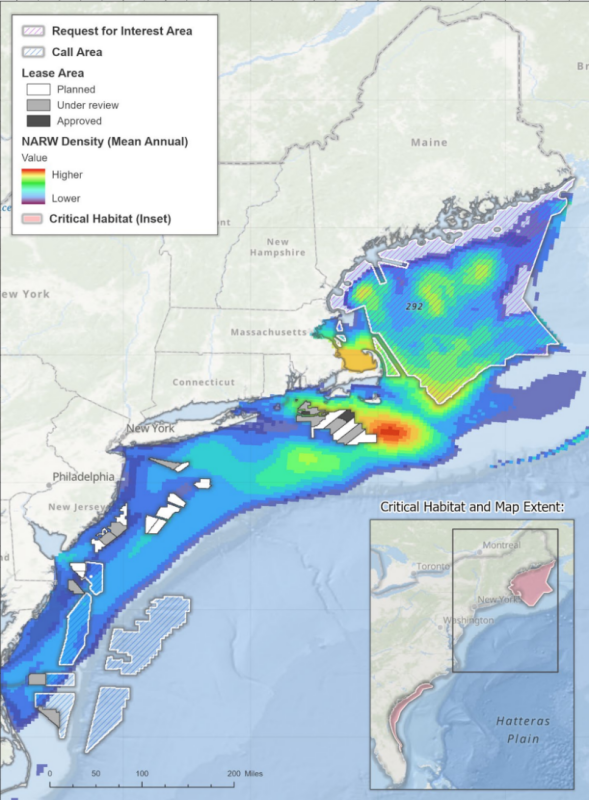Four East Coast congressmen asked top Biden administration officials how their agencies responded to a May 2022 scientific recommendation for wider buffer areas around offshore wind projects to protect endangered whales.
In a joint letter Tuesday Reps. Jeff Van Drew and Chris Smith, both R-NJ, Jared Golden, D-Maine, and Andy Harris, R-Md., sought answers from leadership of the Department of Commerce, National Oceanic and Atmospheric Administration and Bureau of Ocean Energy Management.
The request announced by Van Drew is a scene-setter for the southern New Jersey congressman’s March 16 public hearing in Wildwood, N.J., billed by Van Drew’s office as “an examination into offshore wind industrialization."
It could be the first of Congressional hearings by the Republican-controlled House of Representatives into how the Biden administration is permitting offshore wind developments.
"There have been more than twenty whale deaths in just the past three months, an unprecedented number, yet this administration does not bat an eye," Van Drew said Tuesday. "Despite calls for investigations as to why endangered whales keep washing up on our shores, this administration instead has decided to expand offshore wind development, allocating $60 million for projects in President Biden's budget proposal.”
Offshore wind critics in Van Drew’s New Jersey coastal district have pointed to this winter’s strandings of humpback whales – a resurgent species along the Atlantic coast, unlike the highly endangered right whales – in demanding a moratorium on surveys to plan offshore wind projects off New Jersey.
They contend noise from geotechnical survey vessels may have disoriented the whales before their deaths, several determined by necropsy to have been caused by vessel strikes. NOAA officials reject those claims, saying the humpback strandings are part of a larger “unusual mortality event” that has been tracked since 2016.
So far this winter’s toll has included one right whale, a 20-year-old male washed up in Virginia, the apparent victim of a vessel strike.
The congressmen’s letter focuses on a May 2022 letter to BOEM from Sean Hayes, chief of protected species for NOAA’s Northeast Fisheries Science Center.
In that letter, Hayes said fisheries science center experts expected that building wind turbine arrays will alter oceanographic conditions in the waters off southern New England, and potentially disrupt the distribution of food for endangered North Atlantic right whales.
Now estimated to number few more than 340 animals, the right whales are threatened by ship strikes, fishing gear entanglements and shifts in their food supply brought on by climate change, according to NOAA and whale scientists.
In the May 2022 letter Hayes wrote that NEFSC staff recommended shifting wind energy areas about 20 kilometers (10.4 nautical miles) from the edge of the Nantucket Shoals area, to reduce that potential for negative effects.
“As offshore wind energy projects in southern New England progress in development, in particular around Nantucket Shoals, it is critical to assess the range of impacts/threats and stressors to protected species and the degree to which they can be mitigated,” wrote Hayes. “This needs to include taking into consideration the chronic state of right whales and the importance of productive foraging habitats to these species.
“These impacts should be thoroughly analyzed in any EIS (environmental impact statement) or other environmental reviews associated with offshore wind development.”
The Hayes letter focused on finding the right sites for building offshore turbines, but it’s attracted new attention from critics who are demanding a moratorium.
"A NOAA scientist sent out a warning almost a year ago sounding the alarms on the long-term impacts offshore wind could have on the endangered North Atlantic right whale, yet there have been zero changes made to the development process,” said Van Drew.
Hayes’ 2022 letter was specific to southern New England waters. Other whale experts earlier reported that right whales appear to be spending more time in those areas, increasing potential conflicts between whale protections and ambitious plans for building out large offshore power projects.
New Jersey congressmen Van Drew and Smith have coastal districts where local groups, notably in Ocean City, Brigantine and Long Beach Island have arisen to oppose offshore wind projects.
Maryland congressman Andy Harris, whose district includes the Ocean City, Md., resort has a long history of opposing offshore wind along with his constituents in the tourism and commercial fishing sectors. In Maine, some of congressman Jared Golden’s coastal constituents, particularly commercial fishermen, are increasingly alarmed at early state and federal planning to potentially develop the deepwater Gulf of Maine with floating offshore wind turbines.




